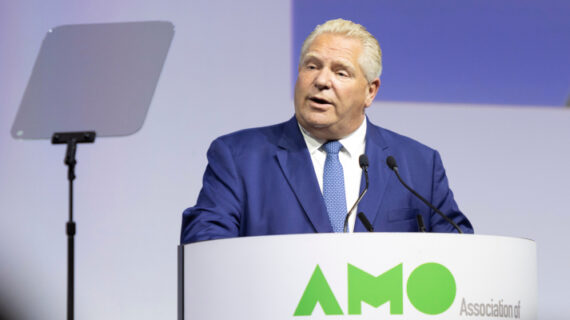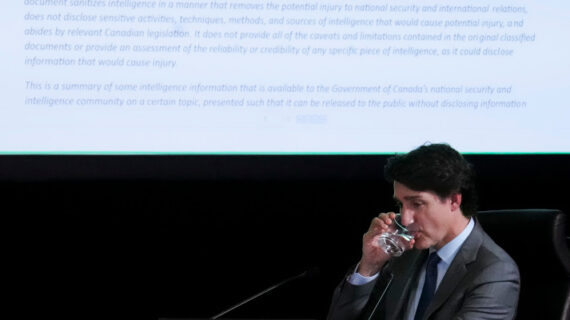This past weekend, I was a guest on the CBC’s weekly call-in show, Cross Country Checkup, to discuss and debate the question: do we still need the CBC?
I was there in particular to make the case that the news media market has evolved over the past decades such that a public broadcaster of the size and scope of the CBC is no longer justified. Others argued in favour of preserving the CBC. And then there was a combination of callers and experts who found themselves somewhere in the middle.
The premise behind the episode was that there are a few big developments looming over the CBC that threaten its ongoing existence. The first is that Conservative Party leader Pierre Poilievre has promised to defund the CBC and seems committed to delivering on his commitment. It remains one of the most popular applause lines in his speeches to party supporters.
The second is growing polling evidence that CBC is not only losing its salience with the Canadian public but that even a majority of non-conservatives believe that the public broadcaster has an anti-conservative bias in its news reporting.
The third is the broader disruption in the media industry itself including the decline of legacy news media organizations and the rise of web-based start-ups that are experimenting with new and different business models to reach their audiences and sustain their operations.
In light of these developments, there were various arguments put forward during the episode in favour of the CBC including the need for a single public institution to connect Canadians from coast to coast, that it represents a bulwark against the rise of so-called “misinformation” and “disinformation”, and that its listeners and viewers like its content.
Due to the number of guests and callers, I didn’t have the opportunity to address these arguments as directly and fully as I would have liked. Let me respond to them now.
The first one speaks in part to a conservative concern that in a world of growing fragmentation and diversity, there are few sources of common citizenship and identity in Canada and the risk is a gradual drift from what Rabbi Jonathan Sacks has referred to as a “home society” to a “hotel society.” That is to say, in an absence of common stories and shared understandings of ourselves and the country, the danger is that we devolve into a loose collection of individuals merely living in the same geography.
This is a legitimate concern that we’ve written about and discussed at The Hub. Yet the notion that the CBC is a key source of common identity belies the facts—including its relatively small audience, divided public opinion about its ongoing purpose, and growing tendency towards micro-narratives at the expense of a broader national story.
The latter point is worth addressing more fully. Although the CBC should be lauded for concerning itself with diversity and representation within its organization and content (including news reporting), there was a sense among many of the callers that it has overcorrected for the historical underrepresentation of different stories and voices.
This is consistent with my own experience as a listener and viewer. The network’s emphasis on identity issues can cause it to lose the forest for the trees. It has increasingly contributed to a narrow and unrepresentative conception of Canadian civic life that undermines its ability to still play a nation-building role.
The next argument that the CBC is needed to contest misinformation and disinformation (which has been advanced by CBC’s president and CEO Catherine Tait herself) isn’t a self-evident one. It may be that these issues ultimately require some form of collective response—though the past several years have demonstrated the risks of groupthink and so-called “established narratives”—but it doesn’t necessarily follow that it requires a public broadcaster in general or the CBC’s current size and scope in particular.
One might even argue that the right lesson is that centralization and consolidation are a threat to overcoming misinformation and disinformation. They can cause bad ideas and wrong information to calcify in the public discourse and undermine the ability of others to challenge them. The COVID-19 “lab leak” story is a powerful example. The CBC (which referred to the lab leak theory as a “conspiracy theory” and “one of the most persistent and widespread pieces of disinformation during the COVID-19 pandemic”) and other major media organizations plainly got it wrong. Smaller, less established, and typically less liberal outlets were generally the ones prepared to pursue the story and its facts.
The key point here is that today’s fragmented and more decentralized media landscape may be messier and more complicated than the old one, but it’s not obvious that the trade-offs are inherently bad or that it necessitates an ongoing role for the CBC.
The final case that the CBC’s content is good and well-liked by its audience members was both the most common one cited during the episode and the most counterintuitively unpersuasive. No one doubts that the CBC produces good programming or that some Canadians enjoy listening to or watching it. But that’s not a justification for the current level of public resources dedicated to the CBC or a public broadcaster in and of itself.

There are a lot of claims on the public purse that might be popular but that doesn’t make them a good idea. Public policy needs to be rooted in something more principled than “Some people like it.” Even the show’s host, Ian Hanomansing, who deserved credit for his fairness and neutrality, seemed to miss this point.
During the conversation, I observed that The Hub’s podcast is the eighth most popular Canadian-based one in the “culture and society” category and that six of the seven ahead of us are CBC productions. It strikes me as an odd use of scarce public dollars since it’s hard to argue that there’s a market failure in the production of podcasts.
Yet Hanomansing’s reaction was that the relative popularity of CBC’s podcasts is somehow market proof that its content resonates with Canadians and therefore a justification for its ongoing role. The reality is that the CBC has a huge financial advantage (which is based on public subsidies rather than market competition) and is able to cross-promote its content across its well-established channels, including its internet, radio, and television assets. That of course doesn’t mean that its podcasts aren’t good or worth listening to, but it does mean that it’s not a fair measure of the CBC’s true competitiveness or a compelling case for maintaining it.
I don’t mean to be presumptuous but I’m reasonably confident that if we received $1.24 billion in annual public funding (which suffice to say is considerably more than The Hub’s total budget), we could probably climb to higher than the eighth-most popular Canadian-based podcast in our category. We wouldn’t presume however that it was necessarily evidence of our real public support or entitled us to ongoing government resources.
I guess the upshot is that while I was glad to participate in the conversation and think it generally speaks well of the CBC that it permitted such a discussion on its network, I came away no less convinced of the case in favour of “right-sizing” and even defunding the CBC. What that means in practice is still an open question and, as I said on the program, there will soon be a growing onus on Poilievre and the Conservatives to bring greater definition to their plans. But their basic instinct is right as a matter of principled policymaking.
Do we still need the CBC? My answer is still no.




